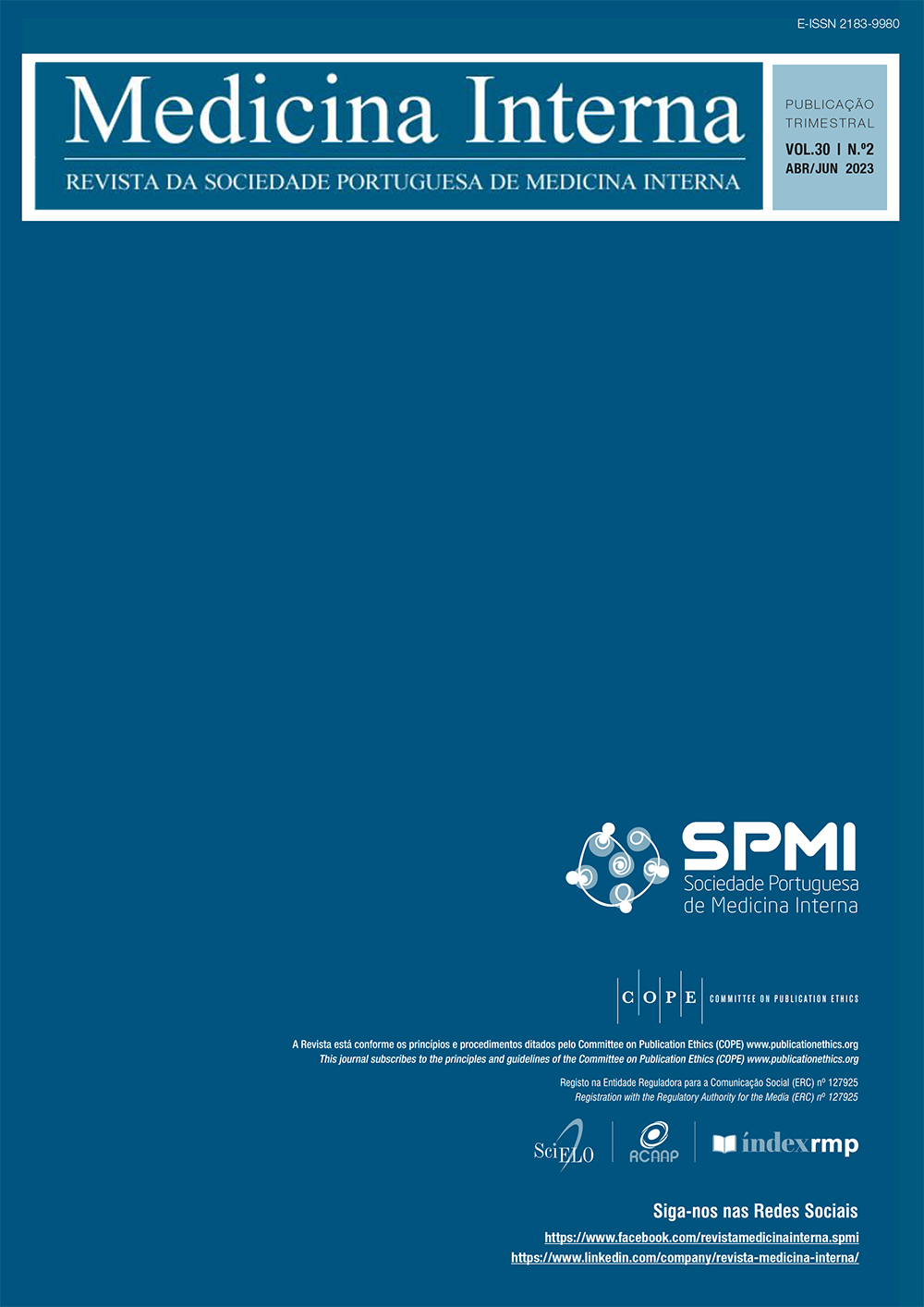Factors Associated with Acute Kidney Injury in Community-Acquired Pneumonia: Development of a Probabilistic Clinical Model
DOI:
https://doi.org/10.24950/rspmi.1401Keywords:
Acute Kidney Injury/diagnosis, Acute Kidney Injury/etiology, Community-Acquired Infections/complications, Pneumonia/complications, PrognosisAbstract
Introduction: Acute kidney injury (AKI) is a frequent complication of community-acquired pneumonia (CAP). Nonetheless, the underlying pathophysiology is not fully understood.
Certain factors have shown association with increased risk,
but there is still data lacking. The main objective of this study
was to identify factors associated with AKI in CAP.
Methods: We conducted a retrospective study in patients
with confirmed CAP, admitted to an Internal Medicine department within a period of 1 year, presenting with or without AKI on admission. We performed comparative statistics between non-AKI and AKI patients, univariate and multivariable logistic regression with odds ratio (OR) calculation, and survival analysis.
Results: This study included 578 patients, of which 52.4%
were male, had a mean age of 81.70±11.54 years, and 41.3% had AKI. The mean age was higher in the AKI group (p<0.001), with no differences for gender. In the univariate analysis, several comorbidities, drugs, diastolic blood pressure and
some gasometric parameters showed association with AKI.
The multivariable analysis selected seven variables as independent associated factors: age (OR 1.027), hyperuricemia
(OR 1.990), chronic kidney disease (OR 3.138), diuretic (OR
1.555), statin (OR 1.805), diastolic blood pressure (OR 0.978)
and serum lactate (OR 1.350), enabling the development of an
AKI probabilistic model with a specificity of 81.1%.
Conclusion: This study confirmed previous findings and
identified new factors associated with AKI, namely serum lactate. The multivariable model represents a starting point for the creation of true predictive indexes of AKI in CAP with clinical applicability and impact on the therapeutic approach and prognosis.
Downloads
References
Akram AR, Singanayagam A, Choudhury G, Mandal P, Chalmers JD, Hill AT. Incidence and prognostic implications of acute kidney injury on admission in patients with community-acquired pneumonia. Chest. 2010;138:825–32. doi: 10.1378/chest.09-3071.
Rodrigues AM, Gregório MJ, Sousa RD, Dias SS, Santos MJ, Mendes JM, et al. Challenges of ageing in Portugal: Data from the EpiDoC cohort. Acta Med Port. 2018;31:80–93. doi: 10.20344/amp.9817.
Froes F. Morbilidade e mortalidade da pneumonia adquirida na comunidade no adulto, em Portugal. Acta Med Port. 2013;26:644–5.
Viasus D, Cillóniz C, Cardozo CG, Puerta P, Garavito A, Torres A, et al. Early, short and long-term mortality in community-acquired pneumonia. Ann Res Hosp. 2018;2:5. doi: 10.21037/arh.2018.04.02.
Murugan R, Karajala-Subramanyam V, Lee M, Yende S, Kong L, Carter M, et al. Acute kidney injury in non-severe pneumonia is associated with an increased immune response and lower survival. Kidney Int. 2010;77:527–35. doi: 10.1038/ki.2009.502.
Chawla LS, Amdur RL, Faselis C, Li P, Kimmel PL, Palant CE. Impact of Acute Kidney Injury in Patients Hospitalized with Pneumonia. Crit Care Med. 2017;45:600–6. doi: 10.1097/CCM.0000000000002245.
Poston JT, Koyner JL. Sepsis associated acute kidney injury. BMJ 2019;364:1–17. doi: 10.1136/bmj.k4891.
Schrier RW, Wang W. Mechanisms of disease: Acute renal failure and sepsis. N Engl J Med. 2004;351:159-69. doi: 10.1056/NEJMra032401.
Jain A, McDonald HI, Nitsch D, Tomlinson L, Thomas SL. Risk factors for developing acute kidney injury in older people with diabetes and community-acquired pneumonia: a population-based UK cohort study. BMC Nephrol. 2017;18:1–16. doi: 10.1186/s12882-017-0566-x.
Chen D, Yuan H, Cao C, Liu Z, Jiang L, Tan Y, et al. Impact of acute kidney injury on in-hospital outcomes in Chinese patients with community acquired pneumonia. BMC Pulm Med. 2021;21:1–7. doi: 10.1186/s12890-021-01511-9.
Murugan R, Weissfeld L, Yende S, Singbartl K, Angus DC, Kellum JA. Association of statin use with risk and outcome of acute kidney injury in Community-acquired pneumonia. Clin J Am Soc Nephrol. 2012;7:895–905. doi: 10.2215/CJN.07100711.
Kellum JA, Lameire N, Aspelin P, Barsoum RS, Burdmann EA, Goldstein SL, et al. Kidney disease: Improving global outcomes (KDIGO) acute kidney injury work group. KDIGO clinical practice guideline for acute kidney injury. Kidney Int Suppl. 2012;2:1–138.
Singbartl K, Bishop JV, Wen X, Murugan R, Chandra S, Filippi MD, et al. Differential effects of kidney-lung cross-talk during acute kidney injury and bacterial pneumonia. Kidney Int. 2011;80:633–44. doi: 10.1038/ki.2011.201.
Lin TY, Chen YG, Lin CL, Kao CH. Increased Risk of Acute Kidney Injury following Pneumococcal Pneumonia: A Nationwide Cohort Study. PLoS One. 2016;11:e0158501. doi: 10.1371/journal.pone.0158501
Downloads
Published
How to Cite
License
Copyright (c) 2023 Internal Medicine

This work is licensed under a Creative Commons Attribution-NonCommercial 4.0 International License.
Copyright (c) 2023 Medicina Interna






